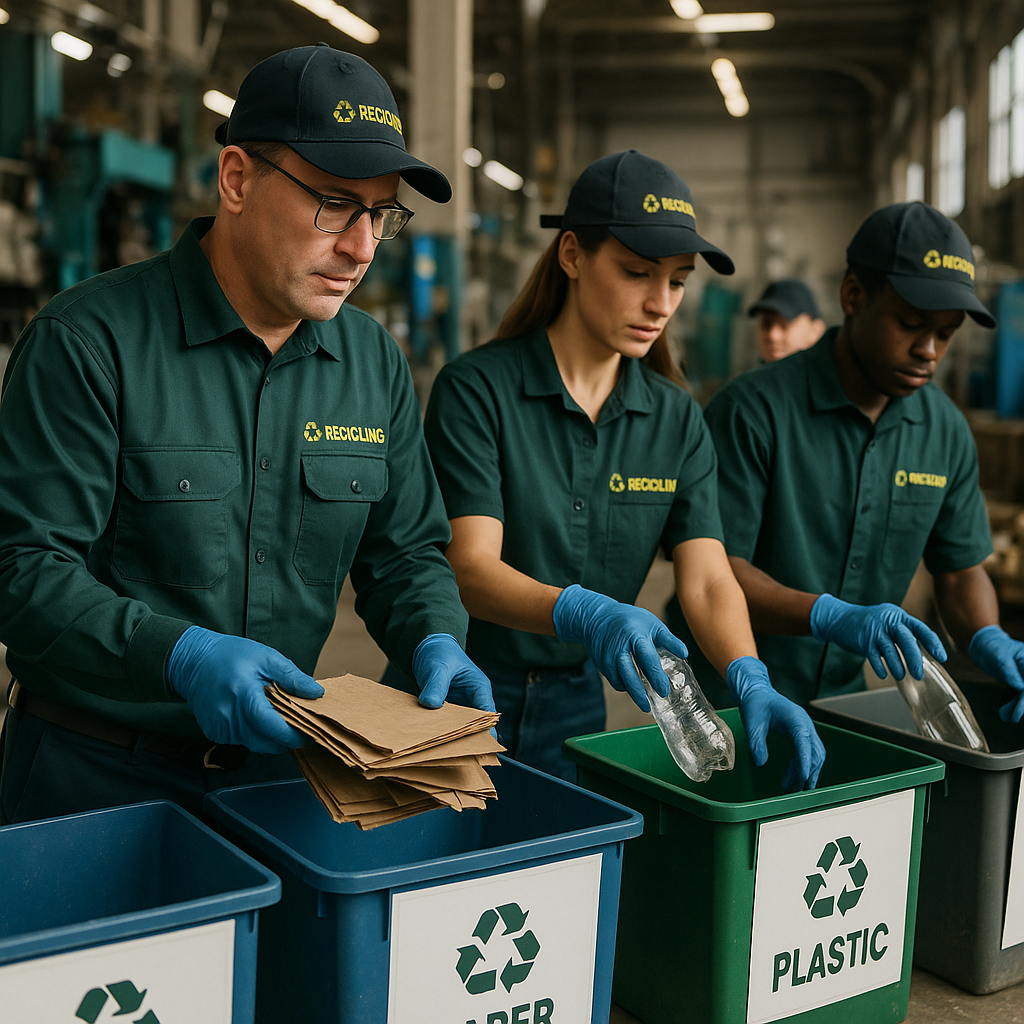5901 Botham Jean Blvd, Dallas, TX 75215
Industrial Waste Recycling Plan: Strategies, Employee Engagement & ROI
September 8, 2025Every manufacturing facility generates waste. From metal scraps and plastic offcuts to paper, cardboard, and electronic components, industrial operations produce significant waste streams that can either burden landfills or become valuable resources. An industrial waste recycling plan offers a viable solution to this challenge.
An industrial waste recycling plan systematically collects, sorts, and processes materials generated by industrial operations to be reused or repurposed rather than disposed of as waste. It covers a wide range of materials commonly produced in industrial settings, including metals, plastics, paper, cardboard, glass, and electronic waste. Implementing such a plan allows facilities to transform what was once considered waste into valuable resources that can be reintroduced into production cycles.
These plans serve as roadmaps for organizations committed to reducing their environmental footprint while potentially improving their bottom line. As production volumes continue to rise across industries, the need for structured approaches to waste management becomes increasingly critical. A well-designed industrial waste recycling plan not only diverts materials from landfills but also creates a framework for resource conservation, operational efficiency, and sustainable manufacturing practices.
How Can Employee Engagement Boost Recycling Efforts?

Employee engagement is the backbone of successful industrial recycling programs. When staff members are actively involved in recycling initiatives, these programs thrive. Engaged employees take ownership of waste management processes, leading to higher recycling rates, reduced contamination, and more efficient resource recovery.
The impact of engagement extends beyond simple compliance with recycling guidelines. Research shows that engaged employees are more likely to identify inefficiencies in waste processes and suggest innovative solutions. They become advocates for sustainability within the organization, creating a culture where proper recycling is the norm rather than an afterthought.
Education and Training: Building Knowledge and Skills
Effective engagement begins with comprehensive education. Employees need to understand not just what to recycle but why it matters. Training programs should provide clear information about the environmental impact of recycling, the specific materials accepted in your facility, and the proper sorting techniques required.
Practical training approaches include:
- Conducting hands-on sorting workshops where employees practice separating different materials
- Posting clear, visual signage at recycling stations with examples of acceptable items
- Implementing regular refresher sessions to address common mistakes and introduce new recycling guidelines
Training should be tailored to address the specific waste streams generated in your industrial setting. For example, manufacturing facilities might focus on metal scrap recovery, while office environments might emphasize paper and packaging materials.
Communication and Feedback: Creating Dialogue
Open communication channels are essential for maintaining engagement. When employees can easily share observations, ask questions, and offer suggestions about recycling practices, they become active participants.
Effective communication strategies include:
- Establishing a dedicated recycling feedback system (suggestion boxes, digital platforms, or regular meetings)
- Sharing regular updates on recycling performance and achievements
- Creating cross-departmental recycling teams to facilitate information exchange
Transparency about recycling outcomes is particularly important. When employees see the tangible results of their efforts—such as reduced landfill costs or increased recycling revenue—their motivation to participate increases significantly.
Recognition and Incentives: Motivating Participation
Recognition programs acknowledge employees’ contributions to recycling success and reinforce positive behaviors. These initiatives don’t need to be costly; often, simple recognition significantly boosts participation.
Effective recognition approaches include:
- Highlighting “recycling champions” in company communications
- Implementing friendly competitions between departments to improve recycling rates
- Providing small rewards for innovative waste reduction ideas or exceptional participation
Some companies have succeeded with team-based incentives, where departments that achieve specific recycling targets receive recognition or modest rewards that benefit the entire group.
Making Recycling Convenient: Removing Barriers
Even motivated employees may struggle with recycling if the process is inconvenient. A critical aspect of engagement is designing systems that make proper waste disposal easy and accessible.
Practical convenience measures include:
- Strategically placing clearly labeled recycling stations throughout the facility
- Ensuring recycling bins are as accessible as trash receptacles
- Standardizing collection systems across different facility areas
Reducing friction in the recycling process significantly increases participation rates and reduces contamination issues that can undermine program success.
Practical Case: Manufacturing Facility Transformation
A metal fabrication plant struggled with low recycling rates despite having collection systems in place. Management discovered that employees weren’t fully participating because they lacked understanding of which metal scraps could be recycled and where different materials should go.
The company implemented a comprehensive engagement strategy that included hands-on training sessions, clear visual guides at workstations, and a monthly recognition program for departments with the highest recycling rates. They also created a recycling team with representatives from each department to address ongoing questions and concerns.
Within six months, the facility increased its metal recycling rate by 65% and reduced contamination by over 40%. The program delivered environmental benefits and generated significant cost savings through reduced waste disposal fees and increased revenue from properly sorted recyclable metals.
This transformation highlights how employee engagement doesn’t just support recycling efforts—it fundamentally transforms them, creating sustainable practices that benefit both the company and the environment.
What Are the Benefits of Implementing an Industrial Waste Recycling Plan?
Implementing an industrial waste recycling plan offers significant advantages that extend beyond environmental responsibility. Companies adopting comprehensive recycling strategies gain competitive benefits through cost savings, compliance with regulations, and an improved corporate image.
Financial Benefits
Cost savings are one of the most compelling reasons for implementing industrial recycling programs. By diverting materials from landfills, companies significantly reduce waste disposal fees, which continue to rise as landfill space becomes scarcer.
Many businesses generate revenue by selling recyclable materials such as scrap metal, plastic, and cardboard to recycling facilities. These materials maintain market value, creating additional income streams that offset operational costs.
Industrial facilities with effective recycling systems report operational cost reductions of 15-30% on waste management expenses. The savings compound over time as recycling infrastructure becomes more efficient and waste sorting processes improve.
Environmental Impact
Industrial recycling programs conserve natural resources by reducing the need for raw material extraction. This conservation extends to energy savings, as manufacturing products from recycled materials typically requires less energy than processing virgin materials.
Recycling industrial waste decreases greenhouse gas emissions by reducing methane production from landfills and lowering the carbon footprint associated with manufacturing new products. These reductions support corporate sustainability goals and climate change mitigation efforts.
Water conservation occurs through recycling processes that require less water than extracting and processing raw materials, a growing concern given water scarcity in many regions.
Regulatory Compliance
Numerous jurisdictions have implemented strict waste disposal regulations requiring responsible waste management by businesses. A structured recycling program ensures compliance with these laws, helping to avoid fines and legal complications.
Companies with proactive recycling programs stay ahead of evolving environmental regulations. As governments worldwide strengthen waste management requirements, businesses with established recycling systems adapt more easily to regulatory changes.
Proper documentation of recycling efforts provides evidence of compliance during inspections, creating a record of responsible waste management practices and protecting companies from potential liability.
Brand Reputation and Stakeholder Relations
Consumers increasingly prefer companies that demonstrate environmental responsibility. An effective industrial recycling program enhances brand reputation and strengthens customer loyalty among environmentally conscious consumers.
Investors favor businesses with strong sustainability practices. Recycling programs signal responsible resource management and long-term business viability, potentially attracting investment and improving shareholder relations.
Employee morale benefits from participation in meaningful environmental initiatives. Staff members take pride in working for companies prioritizing sustainability, leading to improved recruitment, retention, and workplace satisfaction.
Supporting a Circular Economy
Industrial recycling programs contribute to a circular economy model by keeping materials in productive use rather than discarding them. This approach creates a closed-loop system where resources maintain their value.
Businesses embracing recycling often discover opportunities for product and process innovation. Examining waste streams can reveal possibilities for redesigning products to be more recyclable or developing new products from recycled materials.
Supply chain partnerships strengthen when companies collaborate on recycling initiatives, creating new business opportunities and improving resource efficiency throughout the value chain.
Long-term Business Resilience
Recycling reduces dependence on volatile raw material markets. Companies using recycled materials protect themselves from supply disruptions and price fluctuations affecting virgin materials.
Industrial recycling practices promote resource security by extending the lifespan of valuable materials, helping businesses maintain access to essential resources despite increasing global competition.
Forward-thinking waste management prepares companies for a future where sustainable practices become standard. Organizations implementing recycling programs now position themselves advantageously for long-term success in a resource-constrained world.
Conclusion: Taking Action on Industrial Waste Recycling

Implementing an effective industrial waste recycling plan is essential for modern industrial operations. Companies that adopt comprehensive recycling programs not only reduce their environmental impact but also gain significant economic advantages through lower disposal costs and potential revenue from recovered materials. Research shows that businesses implementing waste reduction strategies experience cost savings while improving their regulatory compliance and corporate reputation.
The path to sustainable waste management begins with practical steps: conducting thorough waste audits, engaging employees through proper training, optimizing collection infrastructure, and partnering with specialized recycling companies. These actions create a foundation for continuous improvement in waste reduction and resource recovery. As regulations become more stringent and consumer expectations for corporate sustainability grow, proactive industrial recycling will increasingly distinguish forward-thinking operations from their competitors.
For expert guidance on developing or enhancing your industrial recycling program, contact Okon Recycling at 214-717-4083.
